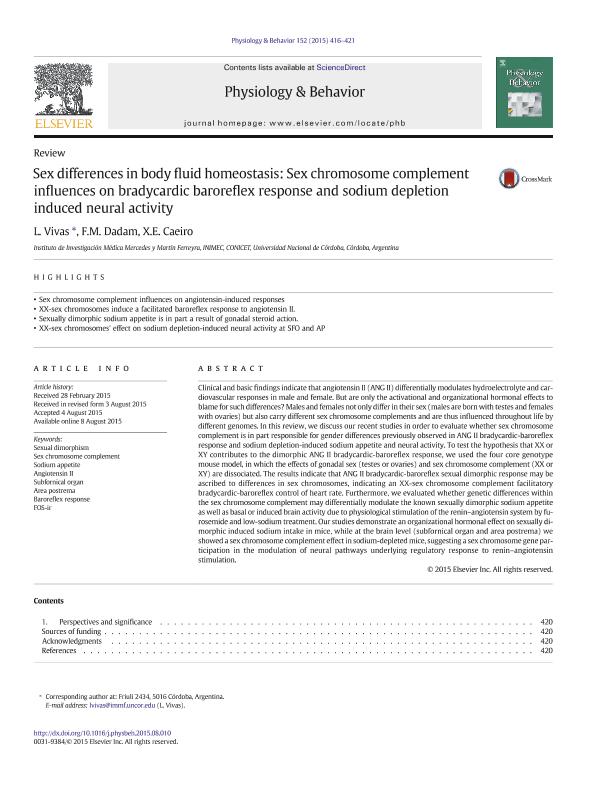Mostrar el registro sencillo del ítem
dc.contributor.author
Vivas, Laura Marta

dc.contributor.author
Dadam, Florencia Maria

dc.contributor.author
Caeiro, Ximena Elizabeth

dc.date.available
2018-06-28T19:46:59Z
dc.date.issued
2015-12
dc.identifier.citation
Vivas, Laura Marta; Dadam, Florencia Maria; Caeiro, Ximena Elizabeth; Sex differences in body fluid homeostasis: Sex chromosome complement influences on bradycardic baroreflex response and sodium depletion induced neural activity; Pergamon-Elsevier Science Ltd; Physiology And Behavior; 152; 12-2015; 416-421
dc.identifier.issn
0031-9384
dc.identifier.uri
http://hdl.handle.net/11336/50483
dc.description.abstract
Clinical and basic findings indicate that angiotensin II (ANG II) differentially modulates hydroelectrolyte and cardiovascular responses in male and female. But are only the activational and organizational hormonal effects to blame for such differences? Males and females not only differ in their sex (males are born with testes and females with ovaries) but also carry different sex chromosome complements and are thus influenced throughout life by different genomes. In this review, we discuss our recent studies in order to evaluate whether sex chromosome complement is in part responsible for gender differences previously observed in ANG II bradycardic-baroreflex response and sodium depletion-induced sodium appetite and neural activity. To test the hypothesis that XX or XY contributes to the dimorphic ANG II bradycardic-baroreflex response, we used the four core genotype mouse model, in which the effects of gonadal sex (testes or ovaries) and sex chromosome complement (XX or XY) are dissociated. The results indicate that ANG II bradycardic-baroreflex sexual dimorphic response may be ascribed to differences in sex chromosomes, indicating an XX-sex chromosome complement facilitatory bradycardic-baroreflex control of heart rate. Furthermore, we evaluated whether genetic differences within the sex chromosome complement may differentially modulate the known sexually dimorphic sodium appetite as well as basal or induced brain activity due to physiological stimulation of the renin-angiotensin system by furosemide and low-sodium treatment. Our studies demonstrate an organizational hormonal effect on sexually dimorphic induced sodium intake in mice, while at the brain level (subfornical organ and area postrema) we showed a sex chromosome complement effect in sodium-depleted mice, suggesting a sex chromosome gene participation in the modulation of neural pathways underlying regulatory response to renin-angiotensin stimulation.
dc.format
application/pdf
dc.language.iso
eng
dc.publisher
Pergamon-Elsevier Science Ltd

dc.rights
info:eu-repo/semantics/openAccess
dc.rights.uri
https://creativecommons.org/licenses/by-nc-nd/2.5/ar/
dc.subject
Angiotensin Ii
dc.subject
Area Postrema
dc.subject
Baroreflex Response
dc.subject
Fos-Ir
dc.subject
Sex Chromosome Complement
dc.subject
Sexual Dimorphism
dc.subject
Sodium Appetite
dc.subject
Subfornical Organ
dc.subject.classification
Neurociencias

dc.subject.classification
Medicina Básica

dc.subject.classification
CIENCIAS MÉDICAS Y DE LA SALUD

dc.title
Sex differences in body fluid homeostasis: Sex chromosome complement influences on bradycardic baroreflex response and sodium depletion induced neural activity
dc.type
info:eu-repo/semantics/article
dc.type
info:ar-repo/semantics/artículo
dc.type
info:eu-repo/semantics/publishedVersion
dc.date.updated
2018-06-26T13:44:47Z
dc.journal.volume
152
dc.journal.pagination
416-421
dc.journal.pais
Estados Unidos

dc.description.fil
Fil: Vivas, Laura Marta. Consejo Nacional de Investigaciones Científicas y Técnicas. Centro Científico Tecnológico Conicet - Córdoba. Instituto de Investigación Médica Mercedes y Martín Ferreyra. Universidad Nacional de Córdoba. Instituto de Investigación Médica Mercedes y Martín Ferreyra; Argentina
dc.description.fil
Fil: Dadam, Florencia Maria. Consejo Nacional de Investigaciones Científicas y Técnicas. Centro Científico Tecnológico Conicet - Córdoba. Instituto de Investigación Médica Mercedes y Martín Ferreyra. Universidad Nacional de Córdoba. Instituto de Investigación Médica Mercedes y Martín Ferreyra; Argentina
dc.description.fil
Fil: Caeiro, Ximena Elizabeth. Consejo Nacional de Investigaciones Científicas y Técnicas. Centro Científico Tecnológico Conicet - Córdoba. Instituto de Investigación Médica Mercedes y Martín Ferreyra. Universidad Nacional de Córdoba. Instituto de Investigación Médica Mercedes y Martín Ferreyra; Argentina
dc.journal.title
Physiology And Behavior

dc.relation.alternativeid
info:eu-repo/semantics/altIdentifier/doi/http://dx.doi.org/10.1016/j.physbeh.2015.08.010
dc.relation.alternativeid
info:eu-repo/semantics/altIdentifier/url/https://www.sciencedirect.com/science/article/pii/S0031938415300639
Archivos asociados
